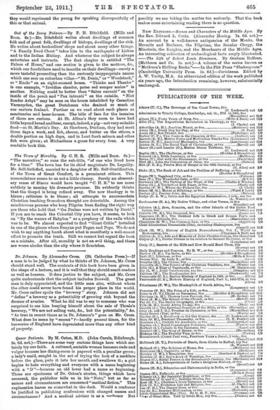Out of the Ivory Palaces.—By P. H. Ditehfield. (Mills and
Boon. es.)—Mr. Ditchfield writes about dwellings of common folk and of great folk, dwellings of bishops, dwellings of the sick. He writes about booksellers' shops and about many other things. "A Family Deed Chest " takes him to the earthquake of Lisbon and to the Indian Mutiny. And whatever the subject he always entertains and instructs. The first chapter is entitled "The Palace of Home," and one section is given to the mottoes, &c., which our forefathers used to inscribe on their dwellings—surely a more tasteful proceeding than the curiously inappropriate names which one sees on suburban villas—" St. Denis," or " Woodstock," or " Knole" on an eight-roomed house. " Thinks and Thanke" is one example, "Invidiae claudor, pateo sed semper amieo" is another. Nothing could be better than "Salim exeunti" on the inside of the porch and "Pax intranti" on the outside. "Niet Zonder Arbyt" may be seen on the house inhabited by Cornelius Vermuyden, the great Dutchman who drained so much of our eastern fenland. Further on we read about such places as sanctuaries and lazar-houses. The bills of fare for the inmates of these are curious. At St. Alban's they seem to have had little beyond bread andbeer, except, indeed,a pig—not very suitable food—on St. Martin's Day. At Sherburn, Durham, they had meat three days a week, and fish, cheese, and butter on the others, a double portion on high days, and in Lent fresh salmon and other fish were given; at Michaelmas a goose for every four. A very readable book this.






































 Previous page
Previous page